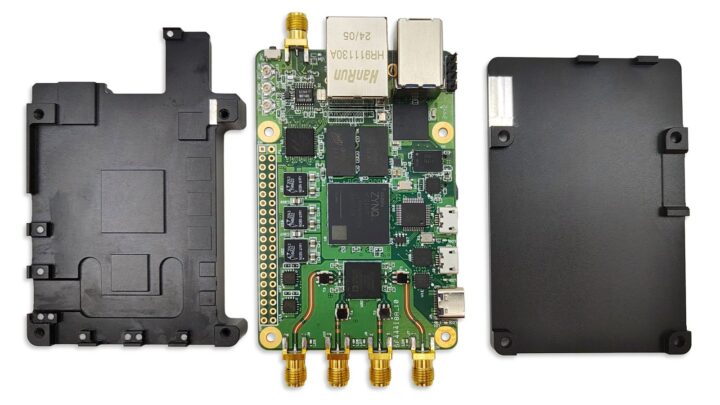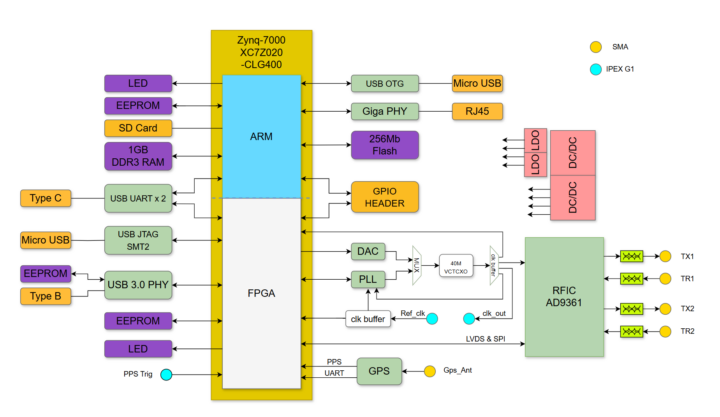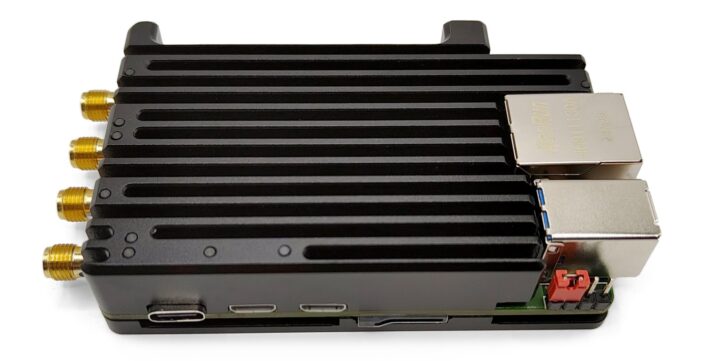The SignalSDR Pro is a Raspberry Pi-sized SDR that brings a credit-card-sized twist to software-defined radios (SDRs). It is a compact, streamlined device suitable for tasks ranging “from signal processing and spectrum analysis to communication systems and beyond.”
The SignalSDR Pro builds on the Analog Devices AD9361 radio transceiver and the AMD Zync 7020 SoC into a credit-card format reminiscent of Raspberry Pi single-board computers. The Raspberry Pi-sized SDR also features a 40-pin GPIO header for expansion with other hardware components and added functionality.
The device offers a 70MHz – 6GHz tuning range, 12-bit sample rate, 61.44MHz RF bandwidth, and two full-duplex TX/RX channels via four I-PEX antenna connectors. It is also capable of emulating other SDR hardware such as the ADALM-PLUTO and USRP B210, making it easier to integrate into pre-existing workflows.
The SignalSDR Pro is a mid-range alternative to entry-level SDR options such as the AntSDR E200, KrakenSDR, and DeepRad and high-end products such as LimeSDR and Ettus B200. We have also covered the Caribou RPI HAT which adds SDR to the Raspberry Pi through its GPIO header.

SignalSDR Pro specifications:
- FPGA – AMD Zynq 7020 SoC FPGA with 2x Arm Cortex-A9 hard cores and 85k logic gates
- RF
- Chipset – Analog Devices AD9361
- Channels – 2 Tx/ 2 Rx (Full Duplex)
- Frequency Range – 70 MHz – 6 GHz
- Max Sampling Rate: 61.44 MHz
- Resolution: 12 bits
- RF Bandwidth – 61.44 MHz
- RF Transmit Power – Up to 10 dBm
- Antenna connectors – 5x I-PEX connectors (1x GPS/analog)
- 1x GPSDO (~ 1 ppm oscillator precision)
- Networking – Gigabit Ethernet RJ45 port
- USB – 1x USB Type-C port, 2x Micro Type-B (OTG) port, 1x USB Type-B 3.0 port
- Expansion – 40-pin GPIO header (unsoldered)
- Boot Options – SD Card / Flash / JTAG
- Debugging – USB-TTL / USB-JTAG
- Dimensions – Raspberry Pi form factor
On the software end, the Raspberry Pi-sized SDR is compatible with multiple platforms like GNU Radio, MATLAB, LabView, DragonOS, LTE Sniffer, OpenBTS, GQRX, and OpenAirInterface. The GitHub repository has more information about the hardware along with tutorials and use cases for getting started.

The SignalSDR Pro campaign is live on CrowdSupply and has surpassed its funding goal by a wide margin. The device is priced at $899 and comes in a metal enclosure that doubles as a heatsink. The bundle includes a microSD card, four 5G antennas for the 700-3800MHz bands, a GPS antenna, three I-PEX-to-SMA cables, USB and Ethernet cables, and two writable, preloaded SIM cards. As usual, shipping is free for buyers in the United States and costs $12 for buyers in other parts of the world. Shipments are scheduled to start by mid-March 2025.

Tomisin is a writer specializing in hardware product reviews, comparisons, and explainers. He is very passionate about small form factor and single-board computers.
Support CNX Software! Donate via cryptocurrencies, become a Patron on Patreon, or purchase goods on Amazon or Aliexpress





